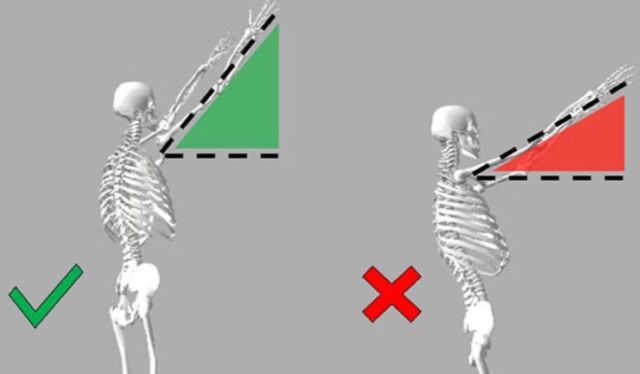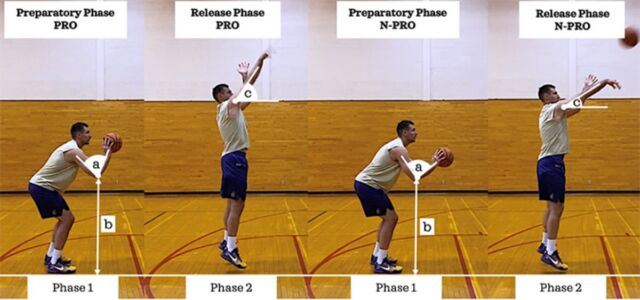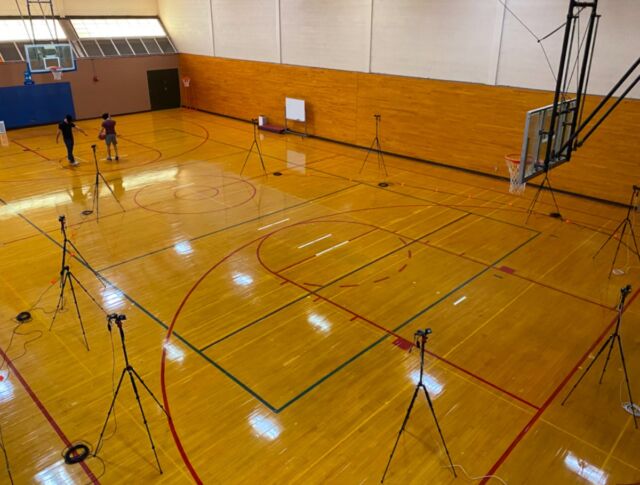[ad_1]
There’s not often time to write down about each cool science-y story that comes our method. So this 12 months, we’re as soon as once more working a particular Twelve Days of Christmas collection of posts, highlighting one science story that fell by the cracks in 2020, every day from December 25 by January 5. At the moment: Utilizing markerless movement seize know-how to find out what makes the perfect free throw shooters in basketball.
Markerless movement seize know-how reveals the biomechanics of free-throw shooters. Credit score: Jayhawk Athletic Peformance Laboratory.
Basketball season is in full swing and in a detailed sport, the staff that makes the very best proportion of free throws can typically eke out the win. A greater understanding of the exact biomechanics of the perfect free-throw shooters might translate into essential efficiency participant efficiency enchancment. Researchers on the College of Kansas in Lawrence used markerless movement seize know-how to just do that, reporting their findings in an August paper printed within the journal Frontiers in Sports activities and Energetic Dwelling.
“We’re very serious about analyzing basketball taking pictures mechanics and what efficiency parameters differentiate proficient from nonproficient shooters,” mentioned co-author Dimitrije Cabarkapa, director of the Jayhawk Athletic Efficiency Laboratory on the College of Kansas. “Excessive-speed video evaluation is a technique that we are able to try this, however progressive technological instruments resembling markerless movement seize programs can enable us to dig even deeper into that. For my part, the way forward for sports activities science is based on utilizing noninvasive and time-efficient testing methodologies.”
Scientists are sports activities followers like everybody else, so it is not shocking that there was a good quantity of prior analysis into numerous elements of basketball. For example, there was appreciable debate on whether or not the “scorching hand” phenomenon in basketball is a fallacy or not—that’s, when gamers make extra pictures in a row than statistics counsel they need to. A 1985 examine proclaimed it a fallacy, and however more moderen mathematical evaluation (together with a 2015 examine analyzing the finer factors of the legislation of small numbers) from different researchers has offered some vindication that such streaks may certainly be an actual factor, though it may solely apply to sure gamers.
Some 20 years in the past, Larry Silverberg and Chia Tran of North Carolina State College developed a technique to computationally simulate the trajectories of tens of millions of basketballs on the pc and used it to look at the arithmetic of the free throw. Per their work, in an ideal free throw, the basketball has a 3 hertz backspin because it leaves the participant’s fingertips, the launch is about 52 levels, and the launch velocity is pretty sluggish, making certain the best likelihood of creating the basket. Of these variables launch velocity is probably the most tough for gamers to regulate. The goal level additionally issues: gamers ought to goal behind the rim, which is extra forgiving than the entrance.
There was additionally a 2021 examine by Malaysian scientists that analyzed the optimum angle of a basketball free throw, primarily based on knowledge gleaned from 30 NBA gamers. They concluded {that a} participant’s top is inversely proportional to the preliminary velocity and optimum throwing angle, and that the latter is immediately proportional to the time taken for a ball to succeed in its most top.

Jayhawk Athletic Efficiency Laboratory.
Cabarkapa’s lab has been finding out basketball gamers’ efficiency for a number of years now, together with how consuming breakfast (or not) impacts taking pictures efficiency, and what occurs to muscle tissue when gamers overtrain. They printed a collection of research in 2022 assessing the effectiveness of the most typical teaching cues, like “bend your knees,” “tuck your elbow in,” or “launch the ball as excessive as doable.” For one examine, Cabarkapa et al. analyzed excessive definition video of free throw shooters for kinematic variations between gamers who excel at free throws and people who do not. The outcomes pointedto larger flexion in hip, knee, and angle joints leading to decrease elbow placement when taking pictures.
But they discovered no kinematic variations in pictures that proficient gamers made and people they missed, so the staff performed a follow-up examine using a 3D movement seize system. This confirmed that larger knee and elbow flexion, and decrease elbow placement have been essential components. There was just one important distinction between made and missed free throw pictures: positioning the forearm nearly parallel with an imaginary lateral axis.

Dimitrije Cabarkapa
A third examine checked out kinematic variations between two-point and three-point shooters (each proficient and non-proficient), utilizing high-speed video and a force-plate system. They discovered that good two-point shooters have larger elbow placement and elbow flexion throughout the early section of the taking pictures movement, and larger shoulder flexion/launch angle on the time of the ball’s launch. Against this, good three-point shooters additionally had larger elbow flexion but in addition saved the torso in a near-vertical place, and will attain larger vertical leap heights on the ball’s launch.
Lastly, Cabarkapa’s lab printed a examine analyzing the connection between a participant’s power and their success at taking pictures free throws, two-pointers, and three-pointers. They did not discover a robust correlation, though they concluded this didn’t imply power would not matter when it comes taking pictures accuracy, merely that there are most likely different components to be thought-about.

Jayhawk Athletic Efficiency Laboratory
For this newest examine, Cabarkapa and his colleagues recruited 34 wholesome energetic males with not less than 4 years’ expertise taking part in basketball. After warming up, every participant took 10-15 apply pictures, then stood on the free throw line and tried ten pictures, resting for 10-15 seconds between every one to rule out fatigue as an element. The researchers used a 3D marker much less movement seize system incorporating 9 high-definition digital camera to seize the biomechanics of every shot for evaluation.
The outcomes: the perfect free-throw shooters had extra management over the taking pictures movement, notably over key variables like decrease knee and middle of mass peak and imply angular velocities, in comparison with much less expert shooters. One of the best shooters additionally reached a larger launch top and their trunks leaned ahead much less on the level of ball launch. Lastly, an overemphasis on the peak at launch might typically be counterproductive, inflicting even the perfect free shooters to overlook extra pictures.
“These findings suggest that basketball taking pictures movement is just not so simple as some might imagine. Taking pictures effectivity can’t be merely attributed to 1 biomechanical variable,” mentioned Cabarkapa. “It’s based on a mixture of a number of segmental physique actions carried out in a managed method.”
DOI: Frontiers in Sports activities and Energetic Dwelling, 2023. 10.3389/fspor.2023.1208915 (About DOIs).
Itemizing picture by Jayhawk Athletic Peformance Laboratory.
[ad_2]